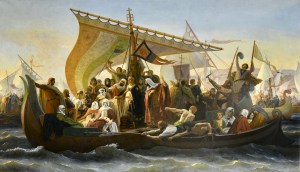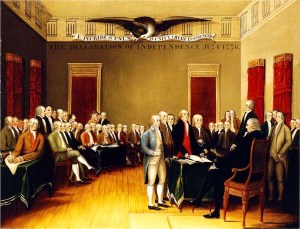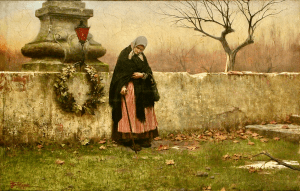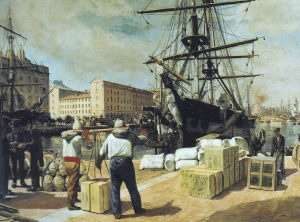We support our Publishers and Content Creators. You can view this story on their website by CLICKING HERE.
The seven pillars of Western Civilization are the edifying edifices which tower over the landscape of the centuries as a fortress of faith and a beacon of reason. Islam has served throughout the centuries as an outside force which has repeatedly laid siege to the fortress, seeking its overthrow.
 Several weeks ago I wrote an essay for this illustrious journal entitled “The Seven Pillars of Western Civilization” in which I listed the seven seminal tomes which form the textual foundation of the civilization of the West. These are The Iliad, The Odyssey, The Aeneid, The Bible, The City of God, the Summa Theologica and The Divine Comedy. Collectively, these texts epitomize why Western Civilization is founded on the three civilizations of Athens, Jerusalem and Rome.
Several weeks ago I wrote an essay for this illustrious journal entitled “The Seven Pillars of Western Civilization” in which I listed the seven seminal tomes which form the textual foundation of the civilization of the West. These are The Iliad, The Odyssey, The Aeneid, The Bible, The City of God, the Summa Theologica and The Divine Comedy. Collectively, these texts epitomize why Western Civilization is founded on the three civilizations of Athens, Jerusalem and Rome.
This is not the place to offer explanations with respect to the rationale for why these seven texts were selected instead of other contenders. Those interested in understanding the reason for the selection are invited to read the original essay.
What surprised me was that several readers of the original essay admonished me for failing to include the Qur’an as one of the seven pillars of wisdom on which Western Civilization is built. This seems to beg the obvious question which I thought my essay had answered implicitly. What exactly is Western Civilization? If it is anything at all, it must be something rooted in a cohesive and coherent set of common values, which are themselves the fruit of cohesive and coherent theological and philosophical principles. In brief and in sum, Western Civilization in its fullness and fruitfulness is a synonym for Christendom. It is the consummation of the mythological and philosophical musings of the Greeks and the fulfilment of the theological covenant of the Jews in the Person of Jesus Christ as made manifest in the Church He founded throughout the centuries since His Incarnation. The quest and questions of Athens and Jerusalem are fulfilled and answered in the Gospel as enunciated by the One who proclaims Himself to be the Way, the Truth and the Life. Christ incarnates the transcendental trinity of the Good, the True and the Beautiful in who He is.
If this is so, the Qur’an is not one of the foundational pillars of wisdom on which the West is built but is a subversive text which undermines those very foundations. If Christ is who He says He is, Muhammed is a false prophet. This is as logically inescapable as it is theologically obvious.
As for the fruit of the Qur’an’s influence with respect to Western Civilization, it has been bitter indeed. Islam as a military force overthrew the emerging Christian civilization in the Middle East and north Africa and would eventually overthrow Constantinople, the capital city of eastern Christendom. At the height of its military incursions into the heart of Christian Europe, it reached as far north as Tours, in northern France. Had Islam prevailed, the Christian Bible and Augustine’s City of God would have been smothered by censorship and the sands of time, which is to say, in modern parlance, that they would have been “cancelled”. There would have been no Summa Theologica of Aquinas and no Divine Comedy of Dante. There would have been no heritage of Western art, no Renaissance, no Romanesque or Gothic architecture, no Shakespeare. These icons of civilization would have been cancelled in a debauch of iconoclasm.
Irrespective of whether we accept or deny the truth claims of the Qur’an, the irrefutable fact is that civilization as we know it in the West would never have existed if Muhammed had prevailed over Christ.
The seven pillars of Western Civilization are the edifying edifices which tower over the landscape of the centuries as a fortress of faith and a beacon of reason. Islam has served throughout the centuries as an outside force which has repeatedly laid siege to the fortress, seeking its overthrow.
There are few better evocations of the real and irreconcilable differences between Christendom and Islam than Chesterton’s poem, “Lepanto”, which tells of the victory of the Christian fleet over an Islamic armada in 1571. If the Christians had been defeated in that naval battle, it is possible that Rome would have fallen as Constantinople had fallen and that Saint Peter’s basilica would have been made into a mosque as Hagia Sophia in Constantinople had been made into a mosque. It is little wonder that the holy and courageous pope, Saint Pius V, should have declared that the date of the battle, October 7, should be celebrated thereafter as the Feast of Our Lady of Victory.
Chesterton ends his poem with a vision of Miguel de Cervantes who had fought and been wounded during the battle. Had he been killed, his classic work of literature, Don Quixote, the first real novel, would never have been written. Perhaps, had he fallen or had the Christians lost the battle, the novel itself as a literary form might never have existed. With this sobering thought in mind, I will end my own defence of Western Civilization with the words that Chesterton used to end his poem:
Cervantes on his galley sets the sword back in the sheath
(Don John of Austria rides homeward with a wreath.)
And he sees across a weary land a straggling road in Spain,
Up which a lean and foolish knight forever rides in vain,
And he smiles, but not as Sultans smile, and settles back the blade….
(But Don John of Austria rides home from the Crusade.)
This essay was first published here in January 2023.
The Imaginative Conservative applies the principle of appreciation to the discussion of culture and politics—we approach dialogue with magnanimity rather than with mere civility. Will you help us remain a refreshing oasis in the increasingly contentious arena of modern discourse? Please consider donating now.
The featured image is “Les chefs de la croisade traversant le Bosphore” (19th century) and is in the public domain, courtesy of Wikimedia Commons.
Share This Story, Choose Your Platform!
Go to Top

 Conservative
Conservative  Search
Search Trending
Trending Current News
Current News 






